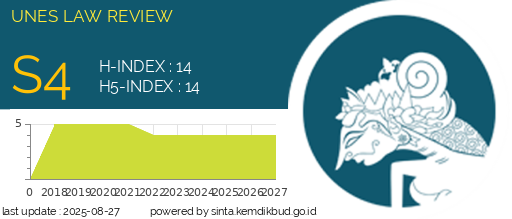Pertanggungjawaban Badan Penyelenggara Jaminan Sosial Terkait Penurunan Kelas Pelayanan Kesehatan
DOI:
https://doi.org/10.31933/unesrev.v6i2.1634Keywords:
Social Security, Health, Participants, ResponsibilitiesAbstract
Insurance is a form of transferring personal risk into shared risk. Likewise, what happened with health insurance in Indonesia which was formed based on Law Number 24 of 2011 concerning Social Security Administering Bodies. The fact is that in implementing this Law there are still many complaints from people using government insurance regarding health services both in hospitals and health services. others are not optimal. The community as participants in the Social Security Administering Agency for Health who are also consumers whose rights are not fulfilled feel that they are served in a discriminatory manner by hospitals and family doctors, of course for various reasons given. The aim of this research is to find out to what extent BPJS is responsible for reducing the class category of BPJS participants based on the premiums that have been paid. The research method used is normative juridical research which refers to library research through data collection and then data analysis and drawing conclusions based on deductive thinking methods. The place of research is not research because the nature of the research is library research. The research results show that consumers in health services often receive unfair treatment, namely not in accordance with the rights they should receive. Even though patients as consumers have the right to receive compensation, compensation and/or reimbursement for the difference in the value of contributions paid. This is clearly regulated in Law Number 8 of 1999 concerning Consumer Protection Article 4 Paragraph (8) that "Consumers have the right to receive compensation, compensation and/or replacement if the services received are not in accordance with the agreement or are not as they should be.”
Downloads
References
Yogyakarta: CV Budi Utama, 2019.
Efendi, Joaedi, Kamus Istilah Hukum Populer, Jakarta: Prenadamedia Group, 2016.
H. Salim dan Erlies S. Nurbani., Penerapan Teori Hukum Pada Penelitian Tesis dan Disertasi, Jakarta: PT RajaGraindo Persada, 2014.
Haspara H. Rachmat, Percepatan Pembangunan Kesehatan di Indonesia, Yogyakarta:
Gadjah Mada University, 2018.
Hamid, Haris. Hukum Perlindungan Konsumen Indonesia, Makasar: Sah Media, 2017.
Hidana, Rudy at.al, Etika Profesi dan Aspek Hukum Bidang Kesehatan, Bandung: Widina Bhakti Persada, 2020.
Muthiah, Aulia., Hukum Perlindungan Konsumen “Dimensi Hukum Positif dan Ekonomi Syariah”, Yogyakarta: Pustaka Baru Perss, 2018.
Nopriansyah, Waldi., Hukum Bisnis Di Indonesia, Jakarta: Prenadamedia Group, 2019.
Pradnyani, Ni Nyoman, Tanggung Jawab Hukum Dalam Penolakan Pasien Jaminan Kesehatan Nasional, Surabaya: Scopindo Media Pustaka, 2020.
Rachmat, Haspara. Penguatan Upaya Kesehatan Masyarakat dan Pemberdayaan Masyarakat Bidang Kesehatan Indonesia, Yogyakarta: Gadja Mada University Press, 2018.
Sitanggang, Tiromsi, Aspek Hukum Kepemilikan Rekam Medis Terhadap Perlindungan Hak Pasien, Kota: Yayasan Kita Menulis, 2019.
Soerjono Soekanto dan Sri Mamudji, Penelitian Hukum Normatif, Jakarta; Rajawali Pers, 2013.
Sukarmi, Cyber Law: Kontrak Elektronik Dalam Bayang-bayang Pelaku Usaha,
Pustaka Sutra. 2008.
Downloads
Published
How to Cite
Issue
Section
License
Hak cipta :
Penulis yang mempublikasikan manuskripnya di jurnal ini menyetujui ketentuan berikut:
- Hak cipta pada setiap artikel adalah milik penulis.
- Penulis mengakui bahwa UNES Law Review berhak menjadi yang pertama menerbitkan dengan lisensi Creative Commons Attribution 4.0 International (Attribution 4.0 International CC BY 4.0) .
- Penulis dapat mengirimkan artikel secara terpisah, mengatur distribusi non-eksklusif manuskrip yang telah diterbitkan dalam jurnal ini ke versi lain (misalnya, dikirim ke repositori institusi penulis, publikasi ke dalam buku, dll.), dengan mengakui bahwa manuskrip telah diterbitkan pertama kali di Jurnal UNES Law Review.



















